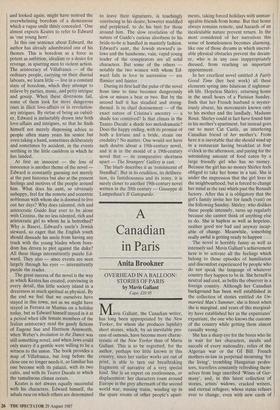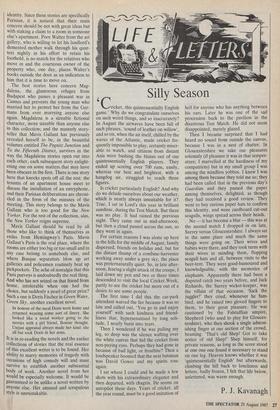A Canadian in Paris
Anita Brookner
OVERHEAD IN A BALLOON: STORIES OF PARIS by Mavis Gallant Cape, £10.95 Mavis Gallant, the Canadian writer, has long been appropriated by the New Yorker, for whom she produces 'apiary short stories, which, by an inevitable pro- cess of osmosis, have become more charac-. teristic of the New Yorker than of Mavis Gallant. This is to be regretted, for the author, perhaps too little known in this country, since her earlier works are out of print, is able to turn out breathtaking fragments of narrative of a very special kind. She is an expert on rootlessness, or displacement: her characters roam around Europe in the grey aftermath of the second world war, missing trains, winding up in the spare rooms of other people's apart- ments, taking forced holidays with unman- ageable friends from home. But that home always remains remote, and hazards of an incalculable nature prevent return. In the most considered of her narratives this sense of homelessness becomes alarming, like one of those dreams in which inscrut- able physical obstacles prevent the dream- er, who is in any case inappropriately dressed, from reaching an important appointment.
In her excellent novel entitled A Fairly Good Time (her best work) all these elements spring into hilarious if nightmar- ish life. Hopeless Shirley, returning home in the small hours of a Parisian Sunday, finds that her French husband is myster- iously absent, his movements known only to his mother and the landlady, Madame Roux. Shirley could in fact have found him in his mother's apartment, but instead goes out to meet Cat Castle, an interfering Canadian friend of her mother's. From here it is inevitable that she should wind up in a restaurant having breakfast at four o'clock in the afternoon, and paying for the astonishing amount of food eaten by a large friendly girl who has no money. Because the girl has no money Shirley feels obliged to take her home in a taxi. She is under the impression that the girl lives in the neighbourhood, but is forced to change her mind as the taxi whirls past the Renault factory. After this it is obligatory that the girl's family invite her for lunch (vast) on the following Sunday. Shirley, who dislikes these people intensely, turns up regularly because she cannot think of anything else to do. She is hapless as well as hopeless, neither good nor bad and anyway incap- able of change. Meanwhile, something really awful is getting ready to happen . . .
The novel is horribly funny as well as intensely sad. Mavis Gallant's achievement here is to activate all the feelings which belong to those episodes of humiliation and discomfort experienced by people who do not speak the language of whatever country they happen to be in. She herself is neutral and cool, as befits the observer in a foreign country. Although her Canadian background has been well established in the collection of stories entitled An Un- married Man's Summer, she is freest when she is marginal, and years of this marginal- ity have established her as the expatriates' expatriate, the one who knows the customs of the country while getting them almost casually wrong.
She has a sharp eye for the bores who lie in wait for her characters, incubi and succubi of every nationality, relics of the Algerian war or the GI Bill: French mothers-in-law in perpetual mourning 'for the living', trembling Hungarian profes- sors, travellers constantly refreshing them- selves from bags inscribed 'Wines of Ger- many', and, in this latest collection of stories, artists' widows, cracked writers, and eternal refugees, whose status refuses ever to change, even with new cards of identity. Since these stories are specifically Parisian, it is natural that their main concern should be not with great ideas but with staking a claim to a room in someone else's apartment. Poor Walter from the art gallery, who is willing to let his landlord's demented mother walk through his quar- ters nightly in his effort to retain his foothold, is no match for the relatives who move in and the courteous owner of the property who, one day, places Walter's books outside the door as an indication to him that it is time to move on.
The best stories here concern Mag- dalena, the glamorous refugee from Budapest who passes a pleasant war in Cannes and prevents the young man who married her to protect her from the Ger- mans from ever marrying anyone else again. Magdalena is a sizeable fictional character, more sizeable than anyone else in this collection; and the masterly story- teller that Mavis Gallant has previously revealed herself to be, in the beautiful volumes entitled The Pegnitz Junction and To the Fifteenth District, survives in the way the Magdalena stories open out into each other, each subsequent story enlight- ening one on some matters that may have been obscure in the first. There is one story here that knocks spots off all the rest: the tenants of an apartment house meet to discuss the installation of an entryphone, and their Parisian deliberations are chroni- cled in the form of the minutes of the meeting. This story belongs to the Mavis Gallant who is too good for the New Yorker. For the rest of the collection, alas, the New Yorker reigns supreme.
Mavis Gallant should be read by all those who like to think of themselves as exiles from Hemingway's Paris. Mavis Gallant's Paris is the real place, where the rooms are either too big or too small and in any case belong to somebody else, and where Basque separatists blow up art galleries and policemen routinely beat up pickpockets. The ache of nostalgia that this Paris purveys is undoubtedly the real thing. And who has not seized on that friend from home, intolerable when one had the choice, but suddenly a pearl of great price? Such a one is Doris Fischer in Green Water, Green Sky, another excellent novel.
In honour of the meal Doris went home and returned wearing some sort of finery. She looked like a social worker going to the movies with a girl friend, Bonnie thought. Unjust appraisal always made her kind: she all but took Doris in her arms.
It is in re-reading the novels and the earlier collections of stories that the real essence of this excellent writer is to be found. Her ability to marry memories of tragedy with occasions of high comedy will and must survive to establish another substantial body of work. Another novel from her would be especially welcome. It would be guaranteed to be unlike a novel written by anyone else. Her amused and scrupulous style is unmistakable.











































 Previous page
Previous page